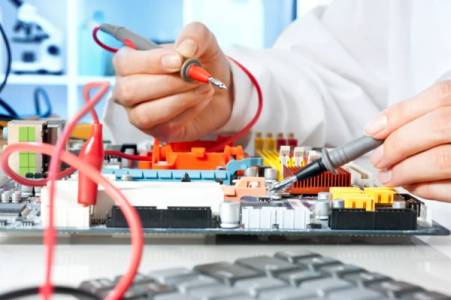Description
Basic Program for Electrical & Electronics Engineering
This comprehensive program provides a solid foundation in the core principles of electrical and electronics engineering. Designed for beginners with little to no prior experience, this program equips students with the fundamental knowledge and practical skills necessary to pursue further studies or enter entry-level positions in the field.
What you'll learn:
This program covers a wide range of essential topics, including:
- Circuit Analysis: Master the fundamentals of DC and AC circuit analysis, including Ohm's Law, Kirchhoff's Laws, Thevenin's and Norton's theorems, and network analysis techniques. You'll learn to analyze and solve complex circuits using both manual calculations and simulation software.
- Electronics Fundamentals: Gain a deep understanding of semiconductor devices such as diodes, transistors (BJT and FET), and operational amplifiers (op-amps). You'll learn about their characteristics, applications, and how to design simple electronic circuits.
- Digital Logic Design: Explore the world of digital electronics, learning about Boolean algebra, logic gates, combinational and sequential circuits, flip-flops, counters, and registers. You'll be able to design and analyze simple digital systems.
- Electromagnetism: Understand the principles of electromagnetism, including magnetic fields, Faraday's Law, and inductance. You'll learn about transformers and their applications.
- Signals and Systems: Learn the fundamentals of signal analysis, including Fourier transforms and Laplace transforms, and apply this knowledge to the analysis of linear time-invariant systems.
- Microcontrollers (Introduction): Get an introduction to the world of microcontrollers, understanding their architecture, programming basics, and simple applications. This section provides a foundational understanding for further specialized study.
- Laboratory Work: Hands-on laboratory sessions reinforce theoretical concepts through practical experiments. You'll gain experience using common electronic test equipment, such as oscilloscopes, multimeters, and function generators. (Specific equipment may vary based on program availability)
Who is this program for?
This program is ideal for:
- High school students considering a career in electrical or electronics engineering.
- University students looking to solidify their foundational knowledge.
- Individuals seeking a career change into the field of electrical and electronics engineering.
- Anyone with an interest in learning the fundamentals of electronics.
Program Outcomes:
Upon successful completion of this program, students will be able to:
- Analyze and solve DC and AC circuits.
- Design and analyze simple electronic circuits using semiconductor devices.
- Design and analyze basic digital logic circuits.
- Understand the principles of electromagnetism.
- Perform basic signal analysis.
- Program and utilize a basic microcontroller.
- Utilize common electronic test equipment.
Program Structure:
The program typically consists of [Number] modules/weeks of instruction, a combination of theoretical lectures, practical labs, and assignments. [Mention delivery method - e.g., online, in-person, blended]. Assessment methods include quizzes, exams, and project work. [Mention duration and schedule if applicable].
Prerequisites:
A basic understanding of mathematics (algebra, trigonometry) is recommended.
Enroll today and take the first step towards a rewarding career in electrical and electronics engineering! [Link to enrollment or further information]
